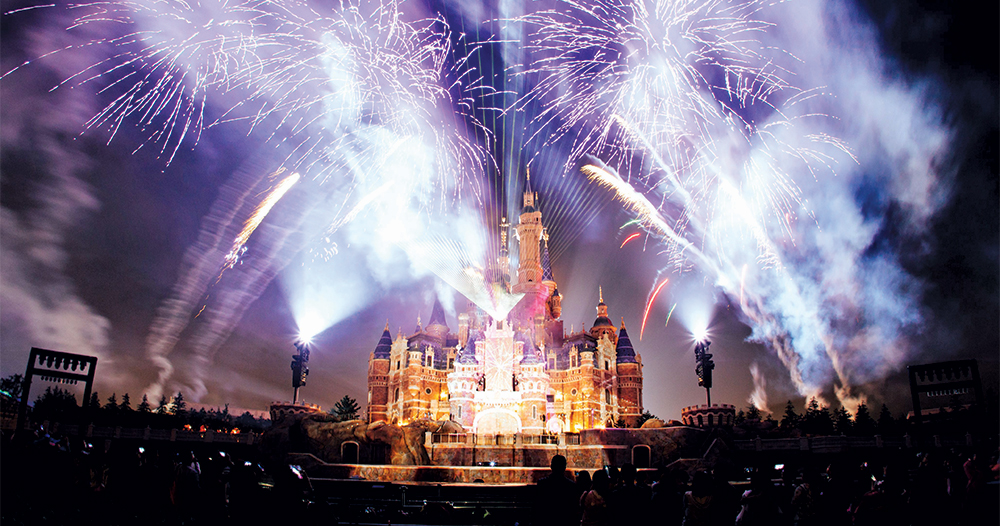China’s Theme Park Biz Heading for Bumpy Ride
By Patrick Frater
LOS ANGELES (Variety.com) – It’s a pattern that should sound familiar.
A promising new sector in entertainment has opened up in China, triggering a gold rush by eager U.S. companies from Hollywood and beyond. Fueled by a booming middle class, the sector’s revenues in the Middle Kingdom grew by nearly 20% last year and now account for up to a quarter of global intake, while the North American market essentially stayed flat.
But the Chinese government, worried about side effects of hyper-growth such as heavy debt and poor-quality product, is warning players to clean up their act and stepping in to head off problems before they become systemic.
In short, what happened with the film industry in now seems to be repeating itself, this time with the theme-park business.
The opening two years ago this week of Shanghai Disney Resort kicked off what real estate consultancy Colliers Intl. calls the third era of mainland China’s theme park industry. The field was characterized by baby steps from 1991 to 2000, then by industrialization by Chinese companies until 2015.
Disney’s massive retail, hotels and park complex in Shanghai inaugurated a new phase of mega-projects combining international brands and IP with substantial Chinese finance. In the pipeline are a Universal mega-park on the outskirts of Beijing; 11 midsize Six Flags attractions in eastern China and the city of Chongqing; and a Lionsgate facility featuring a stage version of magic show “Now You See Me” near Zhuhai, within easy reach of Guangzhou, Shenzhen and Hong Kong.
All are targeted at the nation’s burgeoning middle class and its enormous appetite for travel and leisure. Airlines have proliferated, 50,000 cinema screens have gone up in 10 years and companies are building to thrill the masses.
Few analysts have any doubt demand will continue to rise. Market research company Euromonitor Intl. is predicting 330 million visitors to mainland Chinese theme parks, with admission revenue worth $1.8 billion, by 2020. Themed Entertainment Assn., a trade body, agrees. “We have forecast for several years that China would become the largest theme park market in the world by 2020,” the association said in a recent report. “That forecast remains on track.”
But bumps along the way seem equally likely. After pulling in an above-forecast 11 million visitors in its first 12 months, Shanghai Disneyland saw the numbers drop in the first months of this year, which the company blamed on bad weather. “We saw a nice recovery starting in March and expect the positive trend to continue, given the recent launch of Toy Story Land,” Disney boss Bob Iger said on a recent earnings call.
If little can be done about the weather — though many Chinese operators have built indoor parks — the government is keen that the industry not inflict any self-imposed wounds.
In May, China’s central planning agency warned that developers had cut corners in their rush to open parks. “We’ve seen unclear concepts, blind construction, imitations and plagiarism,” the National Development and Reform Commission said. It also warned that the billions of yuan being sunk into construction could create debt problems for local authorities. And it railed against conventional property developments falsely branded as tourist destinations.
The commission has ordered that mega-parks, defined as costing more than $790 million or occupying 330 acres, seek central as well as regional government approval.
As in the film industry, the example of Dalian Wanda is instructive. Two years ago, Wanda chairman Wang Jianlin threatened on national television to overwhelm Disney with a “wolf pack” of Chinese parks. Shortly thereafter, however, one of Wanda’s new attractions was accused of ripping off Disney characters, and another movie-themed park, which cost more than half a billion dollars to build, closed down after 20 months of operation. By mid-2017, Wanda had sold off many of its parks after being ordered to slash its spiraling debt.
For those companies that remain in the business, there is now a growing prospect of smart and professional expansion of local Chinese IP. Alongside established parks
specialists such as OCT, Songcheng and Chimelong, those joining the fray include companies like Fantawild and Huayi Brothers Media, which have honed their act in both media and parks. Film industry pioneer Huayi already operates a park on Hainan Island structured around the films of Feng Xiaogang. Next month it will open another in Suzhou, with more under construction in Jinan, Nanjing and Changsha.
For all theme park players, domestic or foreign, the industry’s lengthy lead times and heavy capital commitments mean strapping in and committing to the ride long before they know where the scares and switchbacks will be.

